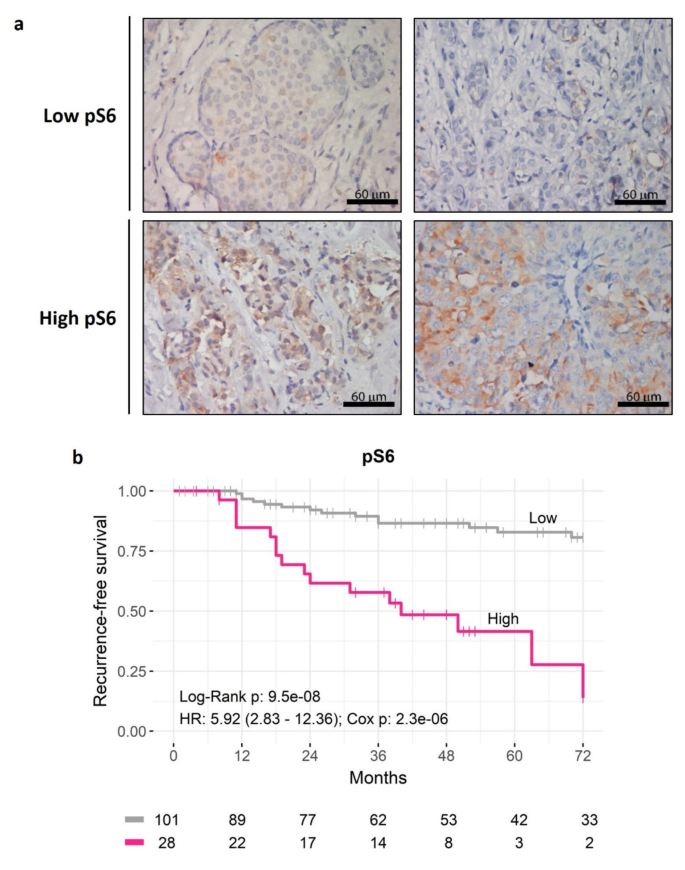Breast cancer is a complex and multifaceted disease, with researchers constantly striving to uncover new insights that can improve patient outcomes. In a groundbreaking study, scientists have discovered a potential game-changer in the fight against breast cancer recurrence. The research, led by a team of experts, has revealed that the levels of a specific protein called ribosomal protein S6 (pS6) could hold the key to predicting the risk of disease relapse in early-stage breast cancer patients. Breast cancer is the most common cancer among women worldwide, and understanding the factors that contribute to its progression and recurrence is crucial for developing more effective treatments. The findings presented in this study provide a promising new avenue for improving patient care and potentially identifying high-risk individuals who may benefit from more targeted therapies.

Unraveling the Mysteries of the PI3K/AKT/mTOR Pathway
The study delves into the intricate workings of the PI3K/AKT/mTOR signaling pathway, which is known to play a pivotal role in breast cancer progression and recurrence. This pathway is responsible for regulating crucial cellular processes, such as cell growth, proliferation, and survival. Alterations within this pathway, including mutations in genes like PIK3CA and AKT1, or the loss of the tumor suppressor PTEN, have been closely linked to the development and progression of breast cancer.
Exploring the Prognostic Value of Phosphorylated Ribosomal Protein S6
The researchers in this study focused on the downstream effector of the PI3K/AKT/mTOR pathway, known as phosphorylated ribosomal protein S6 (pS6). They hypothesized that the levels of this protein could serve as a reliable indicator of pathway activation and, consequently, the risk of disease recurrence in early-stage breast cancer patients.
Uncovering the Link Between pS6 and Recurrence Risk
The study involved a cohort of 129 patients with hormone receptor-positive/HER2-negative breast cancer, a subtype where the PI3K/AKT/mTOR pathway is known to be particularly active. The researchers used immunohistochemistry to assess the levels of pS6 in the tumor samples and then correlated these findings with the patients’ clinical outcomes.
The results were striking: patients with a higher percentage of pS6-positive tumor cells had a significantly shorter recurrence-free survival compared to those with lower pS6 levels. In fact, the risk of recurrence was nearly six times higher in the group with high pS6 expression. Interestingly, the prognostic value of pS6 was even more pronounced when combined with the patients’ lymph node status, further enhancing the predictive power of this biomarker.
Implications for Personalized Breast Cancer Management
The findings of this study have far-reaching implications for the management of early-stage breast cancer. The identification of pS6 as a novel, independent prognostic marker could revolutionize the way clinicians approach treatment decisions. By assessing pS6 levels, healthcare providers can potentially identify high-risk individuals who may benefit from more aggressive or targeted therapies, such as those involving PI3K/AKT/mTOR inhibitors.
Unlocking the Potential of Personalized Therapy
The study also highlights the importance of understanding the complex mechanisms underlying the activation of the PI3K/AKT/mTOR pathway in breast cancer. While traditional biomarkers like PIK3CA mutations or PTEN loss have been used to guide targeted therapies, the researchers emphasize that these genomic alterations do not always align with the actual pathway activation. By focusing on the downstream effector pS6, the study provides a more comprehensive understanding of the signaling dynamics within the tumor, potentially leading to more effective and personalized treatment approaches.
As the scientific community continues to unravel the intricacies of breast cancer, studies like this one hold the promise of transforming the way we approach this devastating disease. By identifying novel prognostic markers and unveiling the intricate workings of key signaling pathways, researchers are paving the way for a future where breast cancer patients can receive tailored, precision-guided therapies that maximize their chances of long-term survival and improved quality of life.
Author credit: This article is based on research by Florencia Cascardo, Micaela Vivanco, María Cecilia Perrone, Andrea Werbach, Diego Enrico, Pablo Mando, Mora Amat, Paula Martínez-Vazquez, Javier Burruchaga, María Mac Donnell, Claudia Lanari, Ariel Zwenger, Federico Waisberg, Virginia Novaro.
For More Related Articles Click Here
